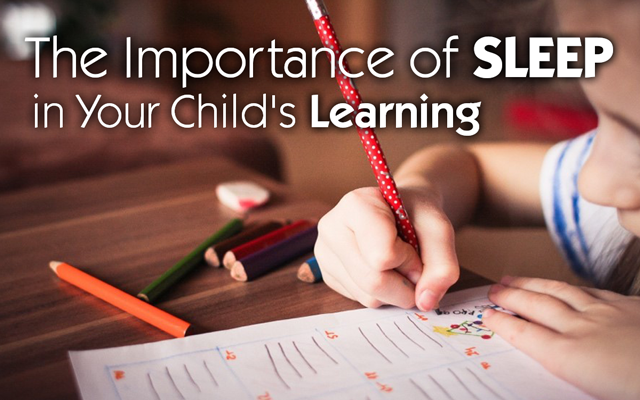The Importance of Sleep in Your Child’s Learning


Sleep is crucial for a child’s growing brain. Studies have found that a good night’s rest can have a massive impact on a child’s ability to develop and ultimately find success in the classroom. In fact, simply getting an extra 18 minutes of sleep a night can have significant effects on an elementary student’s grades in Math and English.
Sleep researchers recommend that school-age children get 9-11 hours of sleep every night, but few actually do. We’ve put together a list, covering the benefits of sleep for a child’s cognitive development, to encourage you to set aside time for your kids to get the rest they need.
1. Improved Memory
While we sleep, the human brain processes information from the previous day to create long-term memories. So, without enough sleep, children can have difficulty recalling new information. Memory is one of the most crucial aspects of learning, and a well-rested brain is more capable of gaining new skills in the classroom and processing information faster.
2. Boosted Cognition
Inadequate sleep has been linked to poor decision-making skills, which can slow down a student in many ways. Restorative sleep can enhance your child’s cognitive skills, including focus and reasoning. It allows children to analyze situations with more clarity of mind and, therefore, be more alert, and productive students.
3. More Creativity
After a rejuvenating REM sleep, the human brain is able to perform high-end abstract thought at a much faster rate. “Sleeping on” a difficult issue may not just be motherly advice; it’s also been scientifically proven to improve creative decision-making and problem-solving skills. Whether a kid is interested in art or science, creativity is crucial to making thoughtful choices, and creating out-of-the-box solutions to issues that might arise in their studies.

A good night’s rest should be a priority for any parent who wants their child to succeed academically. There are a lot of ways that you can ensure your child gets better sleep, including adapting the different aspects of their daily routine.
A child’s diet should always be well-balanced to maintain an overall healthy lifestyle, but it can also have a direct impact on their quality of sleep. Nutritious meals can eliminate common sleep issues that often keep kids awake at night, including nausea and hunger. If your child struggles to fall asleep at night, try giving them a light snack that contains melatonin about an hour before bed. Oranges, bananas, oatmeal, and walnuts all contain the sleep hormone that should make it much easier for your child to drift off.
A child should also have a bedroom that feels relaxing and safe to them. Many kids struggle to fall asleep while being separated from their parents, so make sure you outfit their room to be as comforting as possible. Stuffed animals, a soft mattress, and a nightlight can all help your child feel secure enough to sleep through the night.
Children are constantly bombarded with new information and must be able to adapt to the world around them. So, make sure you set aside time for them to get their much needed ZZZ’s; it can be an investment in their future success and health.
– Jaclyn D..










































